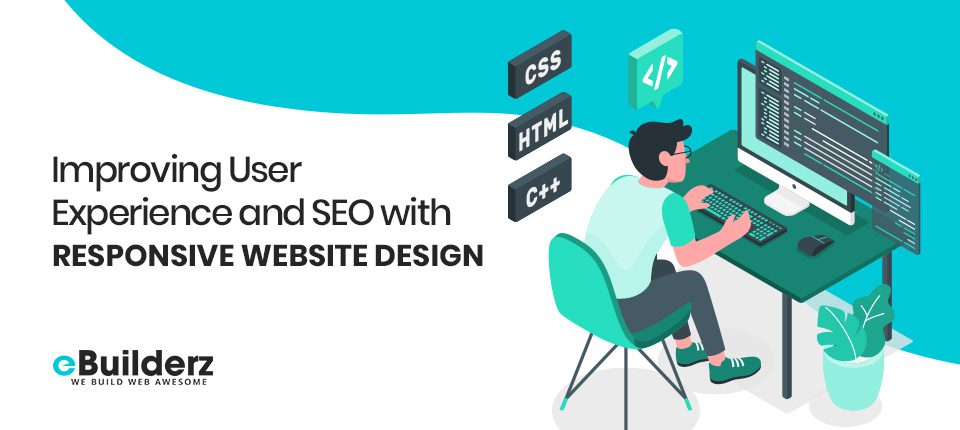
In an increasingly digital landscape, having a responsive website design isn’t just a trend; it’s a necessity. Beautifully crafted web sites will enhance the user experience and play a pivotal role in boosting the website’s search engine optimization (SEO) capabilities. In this informative blog post, we will explore the various aspects of responsive web design and how it can significantly improve user experience and SEO.
What Is Responsive Web Design?
Responsive web design is an innovative approach that allows websites to adapt seamlessly to different screen sizes and devices. It achieves this adaptability through flexible layouts, fluid grids, and media queries, ensuring the website looks and functions optimally on various devices, including desktops, laptops, tablets, and smartphones.
Table of Contents
Why You Need a Responsive Website?
1. Enhanced Mobile User Experience: With the creation of mobile devices, catering to mobile users is imperative. A responsive web design ensures that your website delivers a flawless smartphone experience, reducing bounce rates and improving user engagement.
2. Faster Page Loading: Responsive websites are optimised for swift loading on mobile devices. This improved loading speed enhances the UI experience and aligns with Google’s preference for faster sites, positively impacting SEO.
3. Consistent Branding: Consistency in branding is crucial for building trust and recognition. A responsive website ensures that your brand’s look and message remain consistent across all devices, reinforcing your brand identity.
Responsive Web Design Concepts and Key Practices
To harness the full potential of responsive web design and its impact on SEO, consider the following concepts and best practices:
- Mobile-First Approach:
Develop your website with a mobile-first mindset. Google’s mobile-first indexing prioritises the mobile version of your site for ranking, making mobile-responsive design crucial.
-
Consolidated Backlinks:
A responsive design eliminates the need for separate mobile and desktop URLs, consolidating backlinks and boosting your domain authority.
- Duplicate Content Prevention:
Managing multiple site versions for different devices can lead to the same content issues. Responsive design mitigates this problem, preventing SEO penalties.
-
Flexible Images:
Images are a crucial part of web design, and they need to adapt to different screen sizes. You can use CSS to ensure images scale appropriately and don’t overflow their containers.
-
Navigation Menus:
On smaller screens, traditional navigation menus may not work well. Consider using a responsive navigation pattern like a collapsible menu or a navigation drawer.
-
Accessibility:
Accessibility is vital for all users, including those with disabilities. Ensure your design follows accessibility guidelines, providing alt text for images, keyboard navigation, and proper contrast ratios for text.
So, looking for the best web design agency in los angeles ? Arrive now at eBuilderz Infotech. Here, we offer services in Web design and development to build websites that are highly creative and fit according to your business requirements and directly enhance the right customers and boost the organic traffic. We have expert web designers who create simple to complex websites and our team will create, host, and update the sites for you.
Importance of Responsive Web Design for Website Performance
- Social Sharing:
Mobile-friendly websites are more shareable on social media platforms, leading to increased social signals that indirectly boost your SEO efforts.
- Lower Maintenance Costs:
Maintaining a single responsive website is more cost-effective than managing separate desktop and mobile sites. It frees up resources for content creation and SEO optimization.
- Improved Local SEO:
Responsive design, combined with local SEO strategies, can enhance your visibility in local search results, attracting relevant traffic.
- Enhanced User Engagement Metrics:
Responsive design contributes to longer page dwell times, higher click-through rates, and increased user engagement—all factors that positively impact your search engine rankings.
Conclusion:
In conclusion, responsive website design isn’t merely an option; it’s a fundamental aspect of modern web development that profoundly affects user experience and SEO. As mobile usage grows, providing a seamless experience across all devices is not just a best practice—it’s essential.
By investing in responsive web design through professional services like eBuilderz Infotech, businesses can enhance their online presence, cater to mobile users effectively, and supercharge their SEO strategies. Responsive design ensures that your website meets and exceeds user expectations, leading to higher search engine rankings and improved visibility.
Embrace responsive web design, and you’ll not only cater to the diverse needs of your audience but also solidify your position in the competitive digital world. Your users will thank you, and search engines will reward you with enhanced rankings. If you’re ready to take your web presence to the next level, consider the transformative power of responsive design with us. Your success awaits!
Here are few more topics that you shouldn’t miss:
Healthcare Web Design: 5 Examples To Learn From
How To Transform Your Printing Business From Offline to Online
7 Website Security Best Practices For Your Company
A Complete Guide To Promoting Your Website On Instagram

